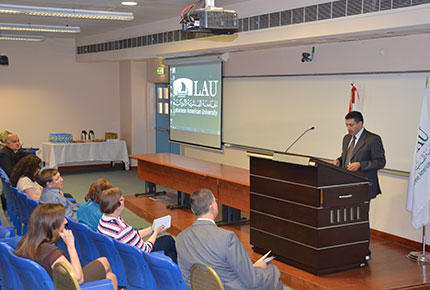“Radicalism brings evil and death”
LAU’s School of Business holds a cross-departmental panel on regional radicalization.

A multi-disciplinary panel offered expertise to the Syria Lebanon Partnership Network of the Presbyterian Church.
A cross-departmental panel was convened at the School of Business on LAU’s Beirut campus last week to discuss the effect of radicalization in Lebanon, Syria and the region. The findings presented were diverse, covering the fields of politics, inter-faith dialogue, media, health, education and the economy.
Said Ladki, interim dean of the School of Business, opened the session by welcoming visitors from the Syria Lebanon Partnership Network of the Presbyterian Church, whose visit to Lebanon from the U.S. was the impetus behind the event. “My profession is about bringing joy,” said Ladki, a specialist in hospitality and tourism, adding, “and radicalism has brought evil and death to the region.” Radicalism, he said, should be promoted in innovation and sport, not religion and politics.
While the current threat to the region is from Islamist extremists, professor of Political Science Sami Baroudi explained that radicalization has manifested in all religions. “The political consequences of ISIS at present include the spread of violence, the legitimization of the regimes in Iraq and Syria, and the weakening of the moderate Syrian voice,” he said. However, Baroudi is not concerned that ISIS will manifest strongly in Lebanon. “There is no cradling environment for them here, only pockets of a few hundred people in different parts of the country.”
At the same time, Mary Habib Tofailli and Joelle Majdalani of the School of Business presented the effect of ISIS on the health and business sectors of Lebanon as extremely dire, a result of the influx of refugees precipitated by the extremist group’s jihad. “Unemployment has risen, prices have increased, and services have been stretched,” explained Majdalani, reeling off a long list of statistics that compared Lebanon’s business sector today to the situation before the influx of up to two million refugees.
With the government refusing to allow UNHCR to set up refugee camps, those in need have no choice but to use the services of a health sector that was already struggling to service its own population. “Hundreds of thousands are not receiving the medical treatment they need, and many Lebanese are paying for private health care to make up for the shortfall,” explained Tofailli.
Rima Bahous, chairperson of the Department of Education, did not have better news to share. While the refugee influx began before ISIS became a dominant player in the war against the Syrian regime, the increasing presence of the radical group in Syria has certainly exacerbated the problem. With hundreds of thousands of Syrian youth in Lebanon not receiving an education, the consequences will likely be catastrophic. “6,200 Syrians are currently registered in Lebanese schools’ morning shifts, with a further 50 to 60,000 registered in specialized afternoon school sessions,” she said.
As an educator of youth, LAU prides itself on delivering education in line with the needs of society and industry. “We promote critical thinking, balanced reporting and the rigor of accurate research,” explained visiting professor of Journalism Monika Halkort. The university’s communication program has been encouraging its students to consider the ways in which extremism can be confronted, and to engage in discourse about the impact and legacy of Lebanon’s own political violence.
Discourse, agrees Makram Ouaiss, assistant professor of Political Science, can help strengthen and bring together those who oppose extremism. “While some inter-faith dialogue initiatives in the region have been interrupted as a result of the ISIS threat, others have flourished,” he said. “Moderation has been redefined as a tool of resistance, making it an important value bringing together different religious groups.”
More
Latest Stories
- LAU Family Medicine Graduates to Benefit from a Partnership With Nova Scotia
- AKSOB Assistant Professor Shares Her Vision for the Future of Learning
- LAU Simulation Models Celebrate 20 Years of Learning, Leadership and Service
- The School of Engineering Hosts the Lebanese Electromagnetics Day
- LAU Stands Out on the Sustainability Scores
- Michael Haddad Walks Again for Climate Change and Food Security
- AI in Clinical Practice: Tools, Ethics, and the Human Touch
- Interior Design Students Honor the Past by Designing the Future

